Part 2.
Hannah Fuller's diaries 1820- 1824 and
the story of Morris's father Thomas Fuller
As a consequence of these very pages, we were recently contacted by the
distinguished former County Archivist for the East Sussex Record Office,
Mr Christopher Whittick. He was in process of cataloguing 2 volumes of
the diaries of Hannah Fuller recently purchased for the E.S.R.O. by its
Friends Organisation and now identified as ACC 14146 and to be listed
in the catalogue as AMS 7417/ 1 and 7417/ 2.
Moreover, Christopher had transcribed and annotated some extracts from the
volumes as part of his preparations for the catalogue and was very happy for
us to make use of them (in addition to finding Thomas in the 1851 Census).
For all this kind assistance we would like to convey our gratitude
for this opportunity, albeit in my subjective selection, to observe the
private life of the Fuller family in the decade before Morris's birth and the
events which unfold thereafter on this page.
Jan 1820 – Dec 1821
1 Jan 1821 Her wishes for the year, including her afflicted father,
and ‘what I long to see more of in my dear husband, oh that he had but
those feelings for himself that I have for him’
2 Jan 1820 Mr [John] Vinall’s sermon: ‘I am greatly in hopes that my
dear father heard with some degree of profit, I observed that he wept greatly’;
3 Jan 1820 Shopping, ‘preparing for the dear little expected stranger’;
Chapel, ‘but it was a grief to me that I could not mix faith with the word preached’
7 Jan 1820 Mr F to Brighton
24 Jan 1820 Mr F set off this morning to collect a little of the needful to
satisfy his creditors
25 Jan 1820 Fearful for her pregnancy; ‘rather tried respecting my dear husband,
I fear the state of his soul is no matter of concern with him’;
26 Jan 1820 Mr F set off for another journey ... I believe he is ignorant of what
is passing at times within me ... I am vileness itself
5 Feb 1820 my dear husband though he has said but little yet I think has been aware
that I have been in a poor plight, for he kindly stayed longer than usual after each meal
7 Feb 1820 Her state of mind during her pregnancy; husband went to the public dinner
of the prosecuting society, ‘I almost wish there was no such things as public dinners
for I care not how little Mr F has to do with the world, ... he always returns home as
soon as possible and is particularly abstemious; I took it very kind of him that he went
unknown to me to see if sister V was likely to come and sit with me’
13 Feb 1820 when in the house of God, the enemy seldom fails to set my present
situation before me in the worst light;
18 Feb 1820 my dear husband went to Brighton to take stock, sister R kindly
came to stay in his absence
20 Feb 1820 ‘we heard today that we were likely to be turned out of our present
abode, that out landlord intends selling the house etc etc; I should certainly be
very sorry to leave, I scarcely know a house in Lewes I should like so well’;
speculates that she might ‘be called to the house appointed for all living, the hour of
nature’s sorrow is drawing on apace, and I know not how it may terminate’
25 Feb 1820 last dinner at 217 [High Street] before her confinement;
27 Feb 1820 Gathered encouragement from a dream; at chapel sister V informed
her of the death of Mrs Kell, ‘who know but that before another sabbath I too may be
a corpse’; ‘I should be very thankful could I be at a greater certainty with regard to the
state of my dear husband’s soul, but this I must leave’
29 Feb 1820 Rather hurt at husband’s going to dine at Mr C Hillman’s ...
‘the company of the world I wish to see him wholly abandon except when called by duty’
2 May 1820 Birth of a daughter on 5 March, attended by Dr [Avery] Roberts and preceded
by spiritual encounter with the enemy; her joy at her safe delivery – ‘I even felt that I could have
got up into Mr [John] Vinall’s pulpit and preached to the people’; her providential visit to Mr [William]
Hudson at Stourbridge in May 1819; breast-feeding redolent of her desire that her daughter
‘may in the same way crave after the sincere milk of the word’; dissatisfaction with her appearance, by which
‘the pride of my desperately wicked heart was sorely mortified’; went downstairs on 26 March;
sister R left on Mrs Cathery’s arrival at 217 [High Street]; difficulty in breast-feeding, ‘in this time
I saw more of the filthiness of my corrupt nature than ever I did before, I became sick of the world,
sick of all things in it and sick of myself’
11 May 1820 ‘God in mercy grant that it [the baby] may not be an idol in my heart but in infinite wisdom
keep husband, child, parents, relatives, friends and all other things in their proper places’;
16 Jun 1820 Perturbed by her husband’s failure to return from London, and the grievous things
‘suggested to me by the enemy of my peace’
26 Jun 1820 Mr F went to the funeral of his grandfather
29 Jun 1820 Party of 17 for the christening ‘but I was too poorly to take any active part’;
24 Jul 1820 Has been busy with baby; her anxiety and submission to God’s will
‘it was thine to give and it is thine to take away whenever thou seest fit’
30 Jul 1820 Mr V’s sermon – ‘he did not see how the time went, the devil took great advantage of it
and wrought sadly upon my wicked heart … I felt almost angry with him for keeping on so long … certainly
being home so late makes it awkward for the servants going in time to a place of worship in the afternoon’
[no entries until 22 August]
22 Aug 1820 At Brighton for nearly three weeks while house was cleaned and painted; sister V’s accouchement
on 6 August; family sickness; self-loathing; ‘Besides this dismal catalogue I am sorely tried at the conduct of my
dear husband respecting money matters’
5 Sep 1820 my mind is now happily relieved in consequence of my dear husband having honourably acquitted
himself respecting some money matters that had caused me great uneasiness;
4 Jan 1821 Bed-wetting by baby – ‘she made quite a little pond in the bed’
– brings on feelings of spiritual self-loathing
17 Jan 1821 Strong desire that her husband ‘might be caught in the gospel net’
21 Jan 1821 Glad that God keeps her and her husband together in so much domestic peace and harmony,
‘as we do not, not certainly enjoy any spiritual union’
6 Mar 1821 Mr F went to Jireh this evening to meet with the singers to practice, he was not home till after 10;
reproaches herself for her churlish reception, which he appeared not to notice
8 Mar 1821 I am far from satisfied with J[ane] T yet cannot bring my mind to give her warning
10 Mar 1821 Has given Jane notice to quit – her qualities and faults –
‘her love of dress increases to an unbearable degree’
12 Mar 1821 ‘a girl apparently every way suitable for me came along today’;
Husband’s accounts favourable
16 Mar 1821 I settled to have Sophy Cox
18 Mar 1821 Mr V seemed to have heavy foreboding of what may be coming upon us as a nation
and as a church finding the Catholics are gaining ground; I wrote to nurse having now great reason
to suspect that I shall want her again
25 Mar 1821 Mr V seems greatly to feel the attempts the Roman Catholics are making to get into power;
31 Mar 1821 I am grieved to find what effect the unpleasant affair of some ranges has had upon Mr Hooper,
he has said most unwarrantable things about my dear husband
14 Apr 1821 brother E supped with us … it was brought up respecting Mr S and Mr F not signing the petition;
I spoke my mind too frankly and perhaps too warmly, for it has been a great grief to me that they should act
(according to my opinion) so very inconsistently, however it would have been better if I had preserved silence for Mr F is highly offended
15 Apr 1821 Coping with her husband’s sulky conduct
19 Apr 1821 we had the satisfaction to hear that the bill in favour of the Roman Catholics was thrown out of the House of Lords
by a majority of 39; grieved to hear how brother H felt respecting the leather that was seized at his yard; how much I wish
that [my husband] was of a more frank and open disposition, so that if anything was the matter we might discuss it
2 May 1821 Thoughts of her unworthiness in her pregnancy – ‘I expect to become the mother of nothing less than a fiend’
19 Jul 1821 Coronation day but cannot rejoice, Mr F has gone to Brighton ‘when there was preaching at our chapel,
thereby showing a decided preference to pleasure and giving a proof of his indifference to his soul’s interest
29 Oct 1821 Married five years
2 Nov 1821 unpleasant discussion of the leather affair with brother Hooper, made more so by the conduct of sister H –
I fear there is a breach that never will be healed
18 Nov 1821 Letter from sister H wishing for a reconciliation with ‘my dear husband’
31 Dec 1821 Retrospective account of the birth of her daughter on 22 November while her husband was in Sheffield,
where he called at the Excise Office to see Mr N; ‘my dear husband joined the party that annually meet at his uncle William’s;
oh that the day may come when such company may have no charms for him, when the family of God may be considered by him
as the very excellent of the earth. My brother B it seems has formed an acquaintance with a young lady, how the matter will t
erminate is unknown to us, and sure I am all was settled before time began.’
Jan 1823 – Dec 1824
1 Jan 1823 Suspects that she is pregnant
4 Jan 1823 Clear she is not pregnant
5 Jan 1823 Mr Fuller has made great exertions on behalf of my brother Ebenezer but my father has this day wholly
declined having anything to do with the business that now offers itself;
11 Jan 1823 every possibility that Ebenezer [Morris] will have the business lately carried on by Mr [James] Sturt
13 Jan 1823 brother Ebenezer and Mr F have looked at the premises and are well pleased
18 Jan 1823 E and [James] Sturt’s executors have agreed on terms
26 Jan 1823 Mr [William] Hudson left for Brighton, ‘I think him much improved since he was a little bit of a beau of mine’;
no regrets that they did not marry, despite having ‘within this last year met with many trials to induce me to feel some degree of dissatisfaction’
2 Feb 1823 began strongly to suspect that I am breeding, I find it a trial to me, but a great desire for submission to the will of God
23 Mar 1823 Mr [John] Vinall preached in London, Mr Funnel supplied his place at Jireh, my dear husband therefore accompanied me;
‘satisfied that none but an almighty power can incline his heart to attend constantly
Aug 1823 Long retrospective account of the illness, treatment and death of her daughter Hannah on 19 July 1823, attended by doctors [Avery] Roberts
and his partner Watkins, advised by Dr [John] Gibney from Brighton and Mrs Williams, ‘a woman eminent in the treatment of abscesses’; results of autopsy;
buried ‘in my father’s vault’ on 24 July; her distress; called on Mr [David] Fenner when in London
Sep 1823 Mr F drove us to Newhaven where we had tea; suspects she is pregnant
22 Sep 1823 my husband to London and I to Stone Cross with my dear little girl and sister R
23 Sep 1823 Dicker Chapel; ‘Mr [Thomas] Oxenham preached, and a very profitable opportunity I found it,
but am still in a low place’
28 Sep 1823 Heard [Thomas] Oxenham with much satisfaction, accompanied by husband;
‘how glad should I be did he always attend with me, but this remains still a crook, and a cross that I must carry yet longer’
30 Nov 1823 Long retrospective account of the birth of her daughter on 19 October;
7 Dec 1823 Death of her daughter Sarah Ann on 6 December
20 Dec 1823 Retrospective entry: burial of Mrs Vinall in the garden behind Jireh Chapel on 9 December,
[Thomas] Oxenham officiated; reconciliation between Mr [John] Vinall and Mr F, through the medium of
Mr [William] Spittall and Aunt Fanny; burial of Sarah Ann on 13 December; ‘on 14 December I had the
happiness of seeing my dear husband resume his seat for a constancy at the chapel
31 Jan 1824 Her 34th birthday; thoughts on her life, faith, the loss of her children and God’s providence
1 Feb 1824 The sacrament administered with great solemnity – ‘I am far from being satisfied with being
merely a spectator when I have some reason to believe I ought to be a partaker’
11 Feb 1824 Long rumination on the loss of her children in the context of her faith;
has felt ‘a much greater degree of resignation … than ever before’
5 Mar 1824 What would have been Hannah’s fourth birthday; long contemplation of God’s role
in the death of her two children
14 Mar 1824 Her struggle with satan in contemplating the death of her children
19 Apr 1824 Baby vaccinated
22 Dec 1824 ‘a little secret disappointment’ [she is not pregnant]; ‘I hope I may never become so anxious
for an increase of family as to ask for another child. I wish to be passive, my heavenly Father knows what is best for me,
I would not choose for myself if I could’
The troubled humanity of Morris's mother laid bare tells so much more of the real person in these few brief words
than the combined reams of print and self publicity ever manage to truly convey of husband Thomas Fuller
or Morris Fuller, the son. Would that we had such documents as these from Thomas or Morris themselves!
************
When searching the Census and family histories, it soon became clear that
something was amiss in the Fuller household. A notice in the Brighton Gazette
on December 4th 1845, when Morris was 15, put a very different light on things
and set the next course in the direction of my researches. There is certainly
no mistaking this man for any other Thomas Fuller as he was most certainly
Morris’s father and his life’s course must have profoundly affected the lives of
his family, perhaps going some way to explaining Morris Fuller’s own very
driven life.
The British Newspaper Archivehas been essential to this next part of the story
and to start, we must go back some 13 years earlier in the family when we learn
from the local newspapers in 1832 that the family business, described as
“an established and extensive Business carried on as Curriers and Leather
Cutters for a great number of years to the present time.” has been declared
bankrupt and this notice appears in July 1832 reprinted, as with all these public
notices, from the London Gazette:
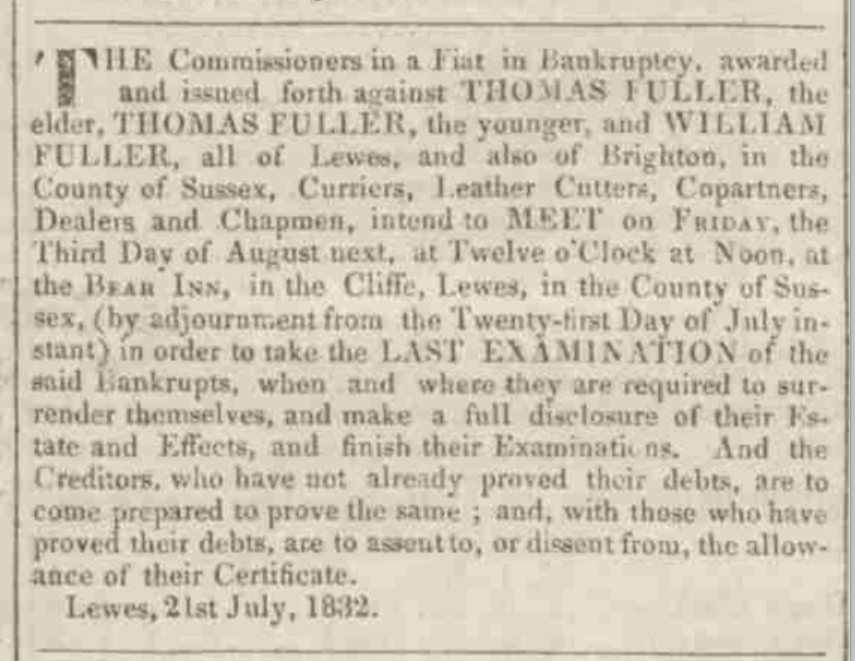
For the next 7 years until the final dividend of 1839, the administration of the
debts and the paying out of dividends is regularly published in the
London Gazette.
The results of these protracted negotiations are not to be found in the local
newspaper columns so we will never know if they had at some point to relinquish
their “Household Furniture of which they were respectively in possession, at their
respective dwelling houses at the date of the Fiat.” However, the appearance
over several issues of notices of “AUCTION SALES” to be held in October shows
that plans had at least in theory been formulated to pay the creditors and salvage
their livelihoods. They show that Messrs Fuller & Son had quite a property
portfolio in addition to their stock in trade as leather merchants:
Of particular interest is a very prestigious investment in what became Adelaide
Crescent in Hove. This is found as 3 of the Auction lots that were to be sold on
12th. October 1832 at the Clarence Hotel in Brighton:
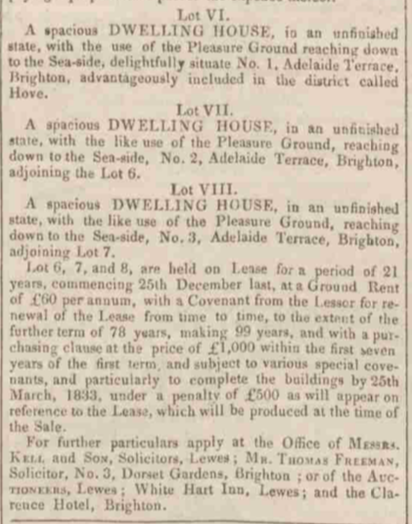
Who eventually was responsible for the completion of Nos 1, 2 and 3
Adelaide Terrace (Lots vi,vii,and viii from the October auction notice above)
has so far been impossible to ascertain, though it is quite possible that
Thomas Fuller’s brother -in-law ( Morris's Uncle, Ebenezer Morris, Brighton
Iron founder and business man) who was a Mortgagee of part of the Fuller estate,
or his brother, William Fuller (one of the Bankrupts and also an Assignee of the
Fiat ) dealt with that part of the debt. However, the houses most surely were
completed along with further buildings soon to become known as Adelaide
Crescent, right at the heart of Regency Brighton on the sea front.
It was sufficiently complete in time to be included in a publication which was
advertised on 27 November 1833 in the Brighton Guardian:
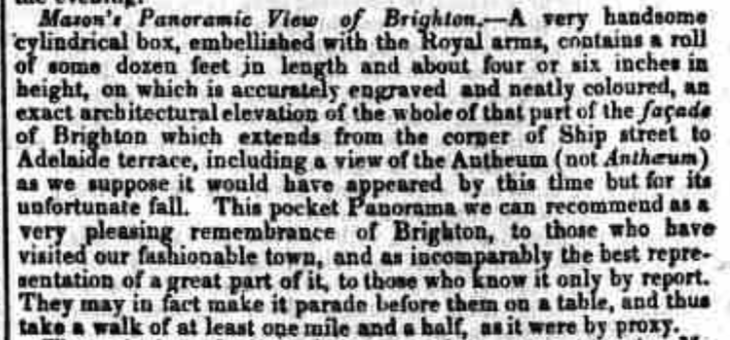
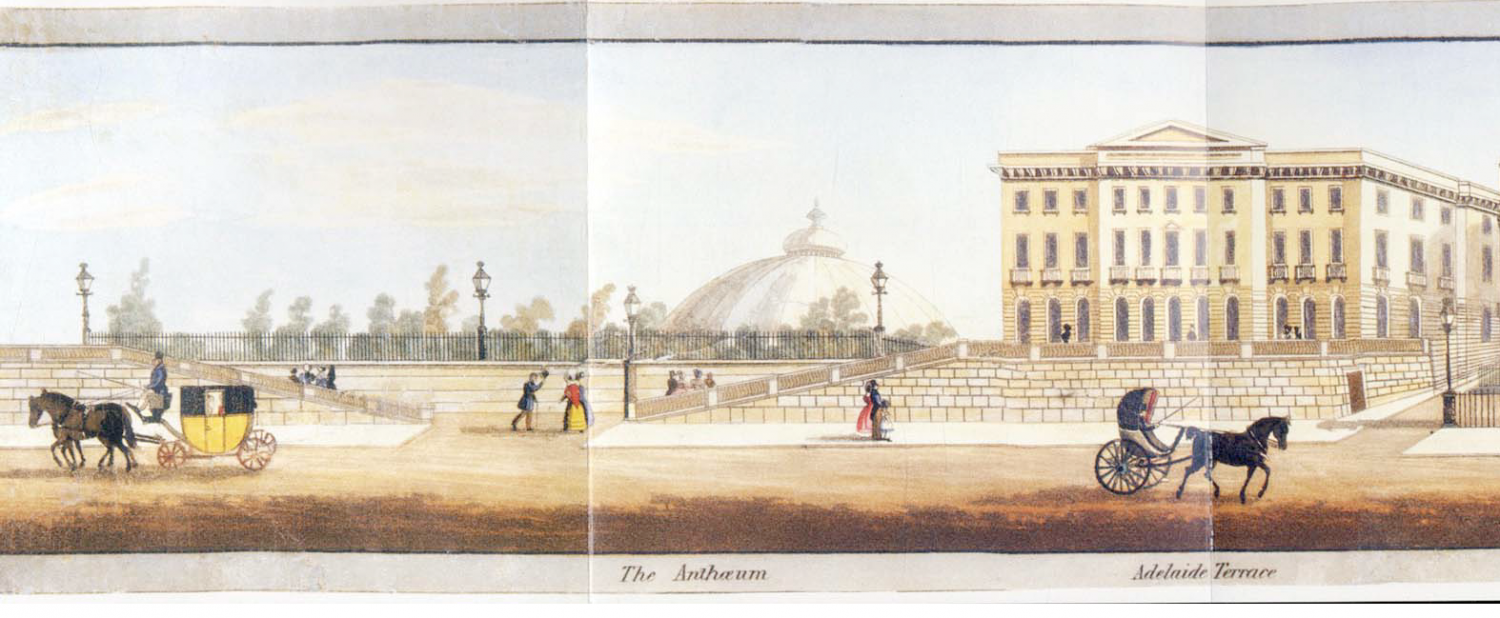
The Antheum was a glass and cast iron domed botanical garden that collapsed
before final completion even though the public were alread visiting it. It is most
fortunate that nobody was killed or injured when it fell. There were meetings called
to rebuild it at a cost of £10,000 but it was never to be.

This venture was a very real part of the property speculations that were building
Brighton into the fashionable place to be, and Morris’s father, Thomas Fuller Jun.,
seems if nothing else to have spent a lot of this part of his life trying to be a part
of it. Along with the properties we have already seen where the family resided,
Nos. 1,2,and 3 Adelaide Crescent are also very much in evidence today, the
remainder of the Crescent being built on the site of the fallen botanical
glass-house
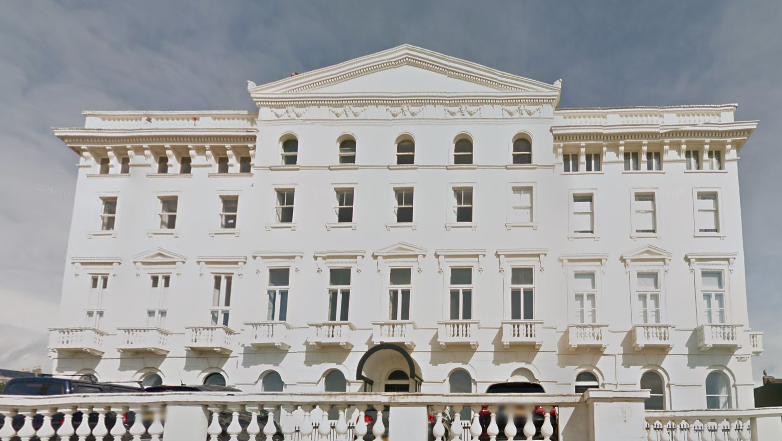
Google Street View
The Brighton Gazette tells us No. 1 was occupied by December 1833 as the
“Hon Mrs Greville, (wife of the Hon. Robert Fulke Greville) has issued cards
for a grand ball and supper on 31st Dec on taking possession of her new house
in Adelaide Crescent”
The paper also announced that “Several houses are now finished in Adelaide
Crescent. The first occupied in that delightful spot has just been opened as
a school.”
With reference to the above, No 5, which wasn’t part of the Fuller auction sale,
was complete and occupied by "Mrs. Davis & Mrs. H Cooper’s Establishment
for Young Ladies” opened on August 1st 1833.
At present, how the family managed to cope with what we would have thought
to be the stigma of bankruptcy is unknown. What the papers do begin to say is
that Thomas Fuller, (and we have now to assume they mean Jun.,) by July 1836,
still in the middle of the bankruptcy, is being proposed for inclusion for election
as one of the Commissoners for the Hundred of Whalebone. At the time 16 such
positions were being contested but Thomas failed to gain a place, coming 18th
in the field. His address then was given as Western Road so he may well have
been living at the Priory then and with Hannah’s school established.
Two years later in January 1838 he failed to make the grade again, this time by
just one place, in a controversial Whig/Tory battle. His 1836 sponsor Mr Bowdidge
“on the part of Mr Thomas Fuller demanded a scrutiny” the result being that
Thos. Fuller’s name was added to the list of those elected but “so loosely had
the election been conducted, it was impossible to make a return and therefore
is null and void” The result was subsequently upheld and so the final list of 27
names were elected.
On 24th April 1838 Mr Bowdidge proposed a list of men including Thomas Fuller
for election to the Vestry to act as Directors and Guardians of the Poor. Other
names based on party political lines were also proposed and much “discussion”
reported. It included the following point made by Mr Bowdidge in defence of an
unidentified proposed candidate:
" A Vestry meeting, which was held previously to the appointment of the
overseers, sent in a list including Whigs, Tories, and Radicals, to the
Magistrates; but did they choose any from the list? No; but one of them
insulted a most respectable man by asking whether he had not been a bankrupt.
He (Mr. Bowdidge) would put it to the meeting whether any man, with the feelings
of a gentleman or a Christian, would have done so? (Loud cheers) It was a
disgrace to the man who uttered the language; and if it had been applied to him
(Mr B) he would have had satisfaction, and if it had not been given, he would
have taken it.
In May 1839 he is found as a Committee member of the newly formed Brighton
Conservative Association .
The papers then report Mr W Barnes was elected to the position of
High Constable on Jan 7th 1841 it is assumed to fill a vacant position
until the next appointment in April 1841:
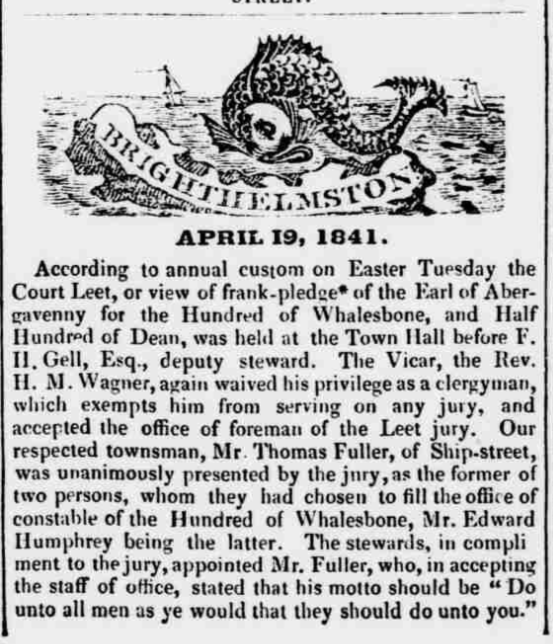
It seems as if on political grounds at least, the bankrupt sheep was welcomed
back to the fold. Whether “Society” at the time was ever entirely comfortable
with the situation is another matter and how it affected the Fuller family is really
the purpose of these investigations
Thomas Fuller had a quite eventful year in office and lest we forget, he had a
wife and 5 children ranging in ages from 9 to18 ; Morris was then 11. For the
first time we see the editorial opinion of Thomas, the man, in the Brighton Gazette:
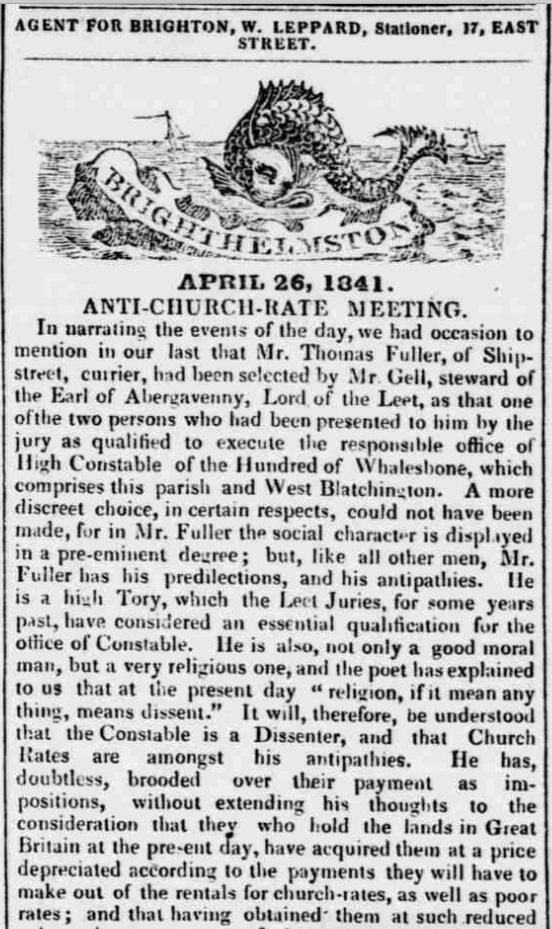
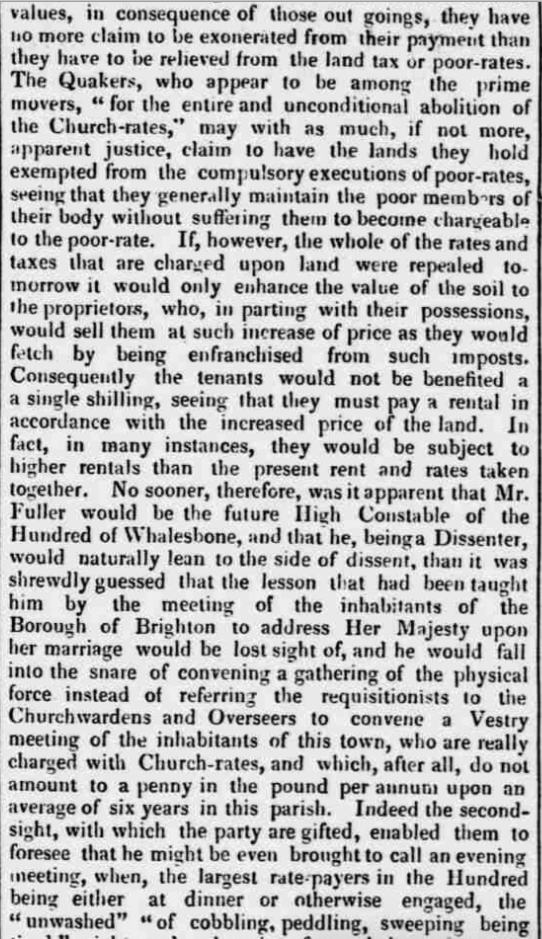
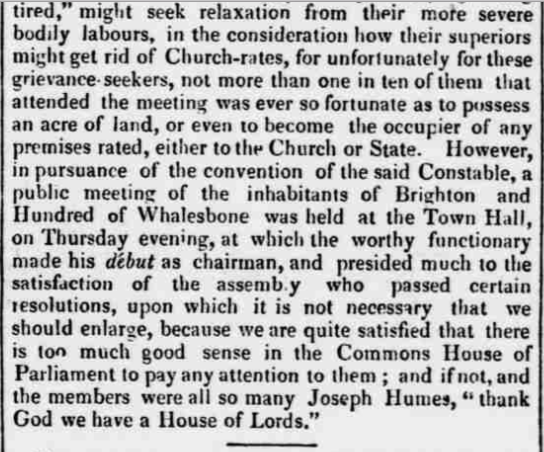
During his year in Office, in April, he supported the sending of a petition to
Parliament, as briefly mentioned above, advocating the abolition of the
Church Rate.
In August he chaired a controversial decision regarding the enlargement of
the Workhouse, rescinding a previous course of action taken by the Vestry.
His chief sucess upon the greasy pole of early Victorian politics was as the
figurehead that announced and attended to the Royal Visit of Victoria and
Albert to Brighton in February 1842. In addition to this auspicious occasion
he was also able to report in the Brighton Gazette on 24th March the following:
The HIGH CONSTABLE takes the earliest opportunity of communicating to
the Inhabitants of the Borough that he had the distinguished honor (accompanied
by Capt. G.R.Pechell. R.N., M.P.) of presenting the loyal and dutiful Address of
Congratulation on the Birth of the Prince of Wales to Her Most Gracious Majesty
the Queen , at a Levee at St James's Palace on the 16th instant, which Her
Majesty was most graciously pleased to receive:
And on the following day the High Constable (accompanied by Captain Pechell)
presented the Address of Congratulation to His Royal Higness Prince Albert, who
was graciously pleased to return the following verbal answer:- “ I beg you will
announce to the Inhabitants of Brighton that I thank them sincerely for their loyal
and dutifull Address, and I wish every prosperity to their town.”
The High Constable (accompanied by Captain Pechell) also on the same day
presented the Address of Congratulation to Her Royal Higness the Duchess of
Kent, who was graciously pleased to return the following answer :- “I am most
sensible of the flattering terms of this Address; and I rejoice to learn that the
emotions with which the Birth of the Prince of Wales animate my own heart, are
so warmly responded to by the loyal inhabitants of Brighton.”
THOMAS FULLER High Constable
Brighton, 21st March 1842.
The following month a new High Constable was elected and Thomas Fuller was
never to reach such heights again. By 1845, though still a Leet Court Juryman
with Montpelier Road given as his address, the dreadful business of Bankruptcy
re-emerged, though this time in a personal capacity, as he was declared an
INSOLVENT DEBTOR and publiscised as such in the Brighton Gazette on
4th December 1845:
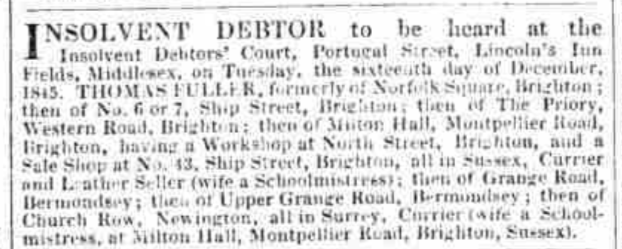
************
The Bubble Bursts
Our next port of call was to look in the London Gazette to find the details of this
latest episode as nothing further is found in the local Brighton papers.
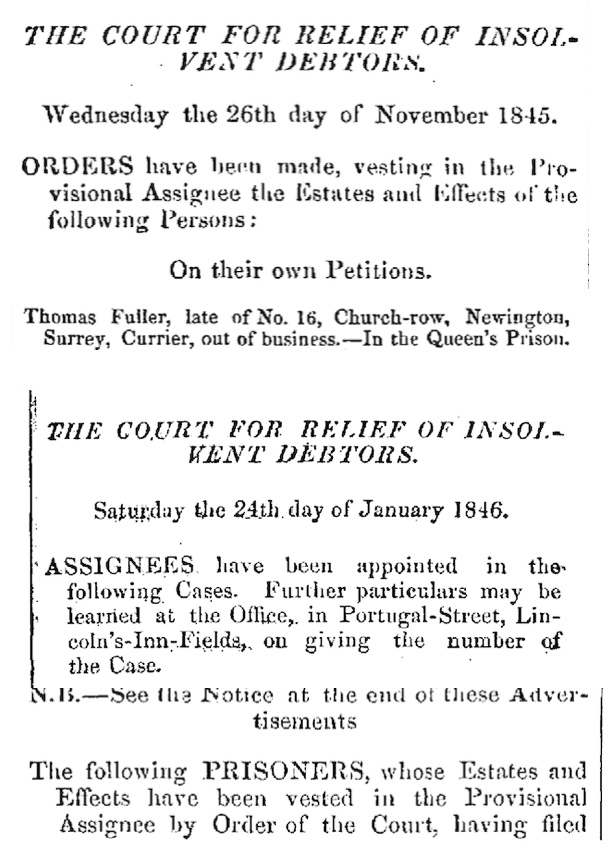
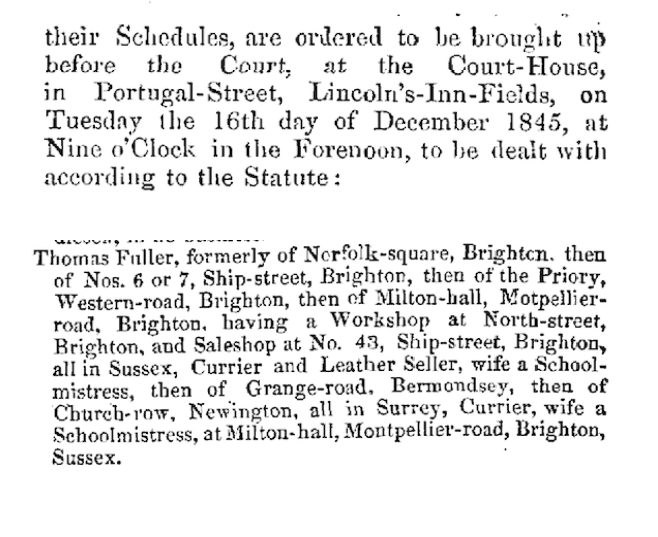
Quite how long Thomas Fuller remained in the Queen’s (Bench) Prison has not
as yet been discovered, but the next Gazette references are for September 1851.
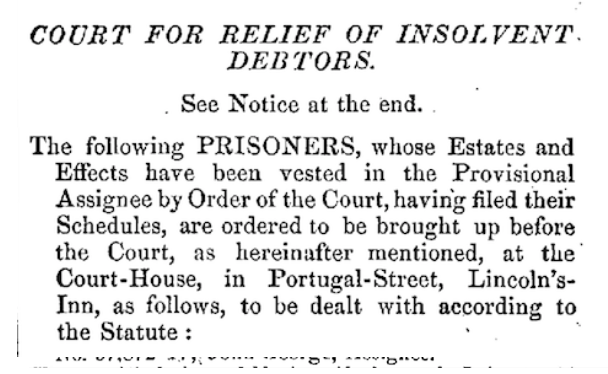
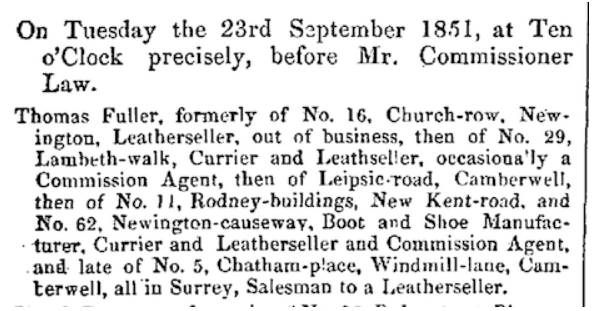
His initial incarceration may have been quite short, after which being released
within the “Rules of the prison” i.e with the immediate vicinity of the prison.
He had, since 1846, been quite active, (trying to pay off his debts ?) and in the
process had accumulated a number of new addresses and occupational changes
within the leather trade.
By June 22 1852 the amount in the pound payable to his creditors is settled. It is
a pitiful amount and rather tells just how far Morris Fuller’s father had fallen from
his glory days in Brighton :


There were very clearly close family connections between Fuller’s, Morris’ and
Hooper’s that allied Non-conformity and the Leather trade. This is apparent
with a number of 1st cousin marriages within those families. Whilst it isn’t evident
that Hannah was willing and able to assist Thomas in his business life, there is
some evidence that the Hooper connection didn’t entirely shun Thomas. The
following Gazette entry suggests that this family connection was perhaps finally
broken with the dissolution of this partnership:
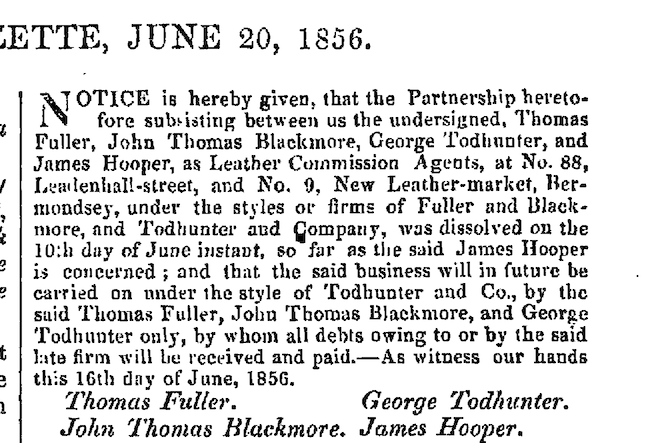
If the above demonstrates James Hooper cutting his losses then does the entry
from the following year show Thomas himself being cut loose?
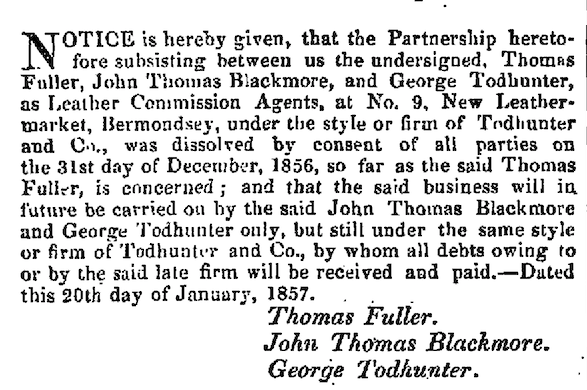
James Hooper tanner and leather merchant was a nephew of Thomas and Hannah
(his brother Benjamin was their son-in-law married to Esther Hannah). He had
married Elisabeth Berry Morris the daughter of Hannah’s brother Benjamin Morris
and so they were also cousins. James seems to have had a varied career and
moved about in his capacity as a merchant with one child born in Liverpool and
another in Brazil. The family emigrated to the USA in around 1867 where he
had the occupation there of a Fire Insurance Clerk.
**********
When Esther Hannah married James’ brother Benjamin in 1843, the notice
appeared in the paper in an expected form:
MARRIED.--On the 15th inst., at Nicholas', Brighton, by the Rev James
Vaughan, Benjamin son of the late Mr Cleeve Hooper, of Bermondsey, to
Esther Hannah, eldest surviving daughter of Mr Thomas Fuller, of Brighton
Was Thomas still within the bosom of his family when Elizabeth Sarah Ann
was married in 1851?

Does this simple notice located in the newspaper columns (insensitively placed
alone above a bankruptcy case) represent the family’s shame about the current
events or does it indicate a deeper rift in the marriage of Hannah and
Thomas Fuller?
He was still styled as a Leather Merchant on Morris and Helen Fuller’s marriage
certificate? It was however his brother, Thomas M.D. who signed as a witness
to the event on December 29th. 1859.
Was Thomas in attendance, at the wedding or indeed at the weddings of any
of his children? We’ll probably never know, but of those certificates that it has
been possible to examine, he does not sign the registers as a proud parent.
**************
Although it is natural to speculate, it is never wise to make any assumptions
about historical figures. It was nevertheless the seeking of evidence to support
a hypothosis, formed when first looking at the Census' lack of information, that
has uncovered the story so far.
The fact that Cornelius Wetherall Fuller, their youngest child, embarked upon
a career in the leather trade does perhaps at least suggest vindication of the
“family business” to Thomas if not to Hannah. From this distance it does very
much look as if Hannah’s interpretation of “family business” was rather different
and she determinedly kept at least a part of the family afloat during what must
have been very difficult times. This also begs the question whether it was her
diligent example that allowed her two other sons to prosper in professions not
quite so susceptible to economic catastrophe, or perhaps she was just simply
attempting to protect them from a profligate father?
One can almost hear the “I told you so” when we find Cornelius also in the
bankrupts’ courts from 1862 to 1878 in places ranging from Bermondsey to
Brixton, Brighton to Northampton and Kidderminster.
The conclusion of this chaotic lifestory is found in the following benign notice in the
Brighton Gazette for Thursday 17th October 1867:
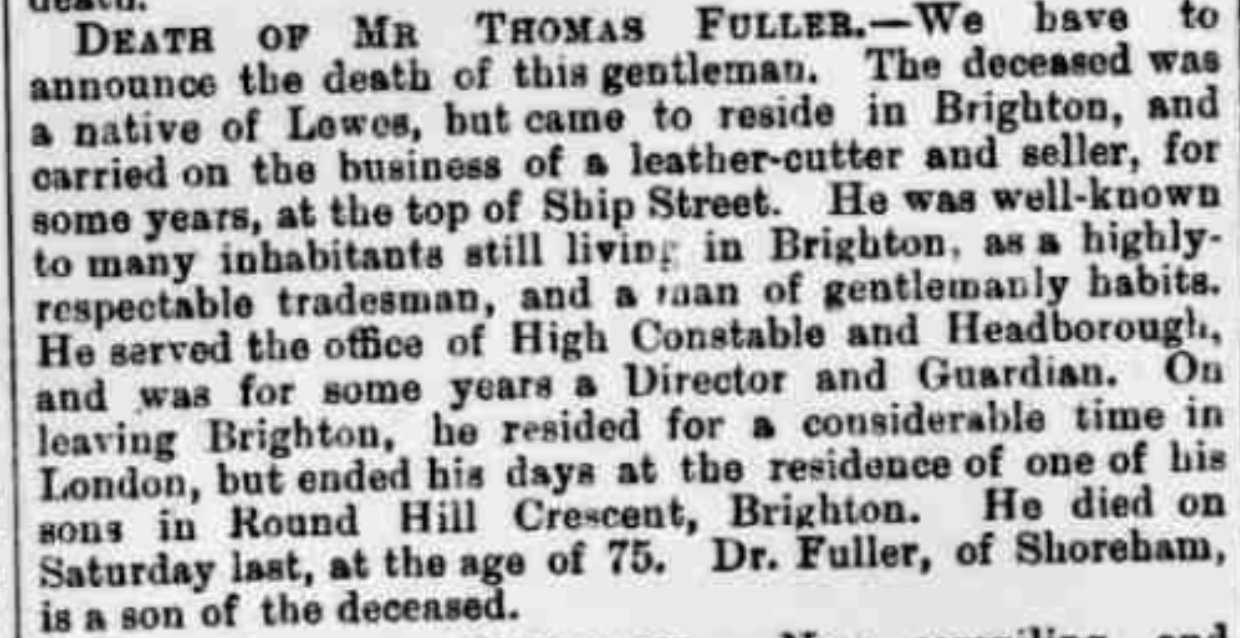
The death certificate gives "Carcinoma" as the cause of death
There is an interesting postcript to this story found in a report of the death of
Morris Fuller in the Sussex Agricultural Express of August 3rd. 1901 and one
wonders if this was a family press release, and an attempt to further rehabilitate
Morris's father for future Fuller generations:
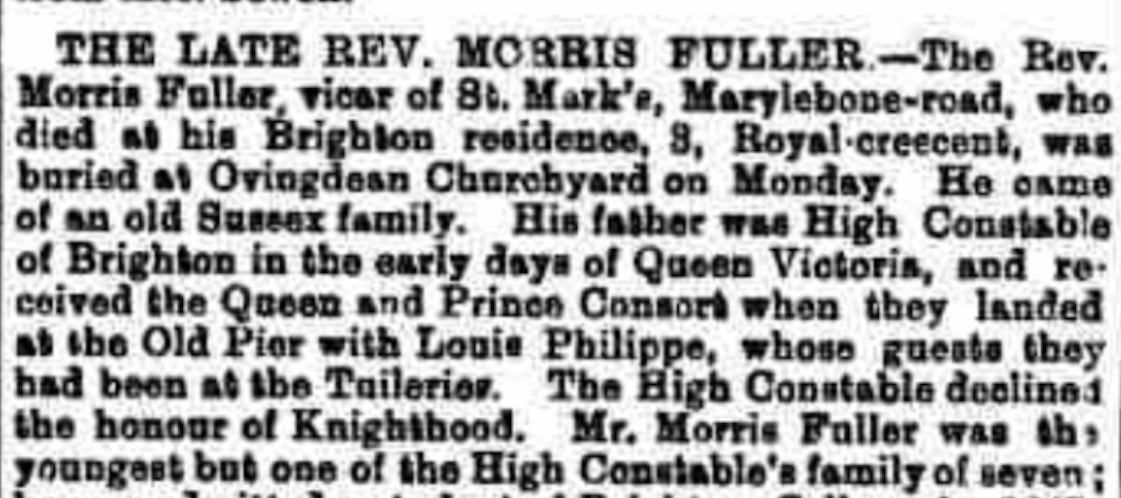
***********
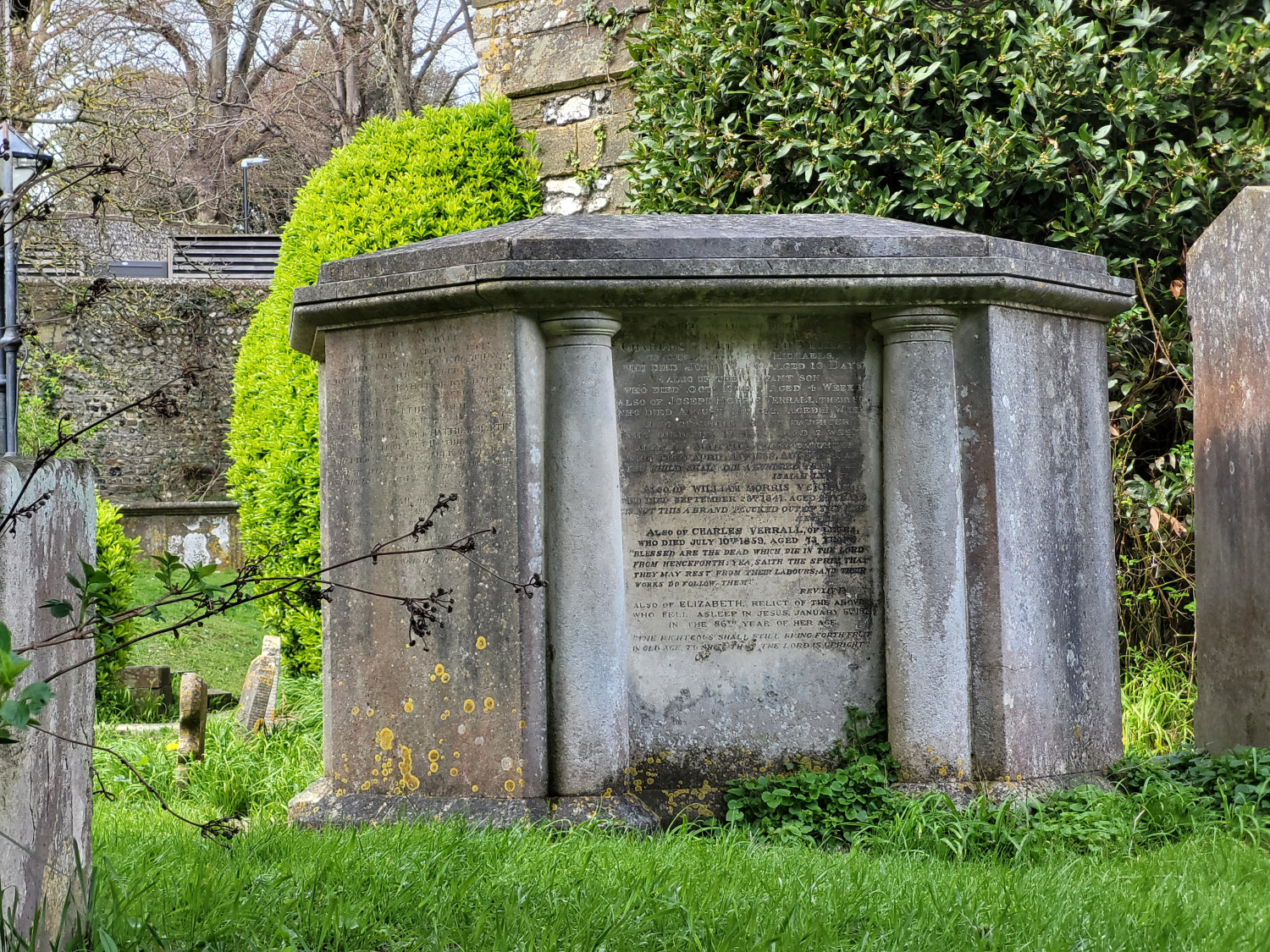
Christopher Whittick kindly ends this page for us with the above photograph of a family monument
in the churchyard of All Saints, Lewes. The church now has for over 40 years been a community
arts and youth centre run by the Lewes Town Council. The prominent edifice commemorates the
Morris family of Lewis and is covered with multiple and fast fading inscriptions where is to be found
Hannah Morris and a part of the family that married the Fullers. Verrals, Martins, Hoopers and
Robinsons are all included on the monument, being the spouses of Hannah's sisters.
Fortunately a transcription of the lettering was made before its current condition made it
difficult to read and it records the following:

The more one sees of the family background, the more one thinks it should be entirely unsurprising
that Morris Fuller turned out to live a life so fraught with contention.